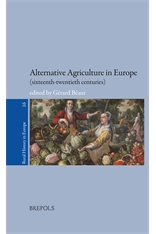Les conditions d'émergence et d'expansion de formes d'agriculture qui étaient et sont encore en contradiction avec le modèle d'une céréaliculture productiviste ont suscité et suscite encore débats et controverses. En proposant l'hypothèse d'une agriculture alternative considérée comme une riposte des agriculteurs confrontés à des phases de dépression des prix, Joan Thirsk entendait proposer un modèle explicatif qui alimenta cependant doutes et critiques.
Les textes de cet ouvrage constituent autant de scénarios envisagés sur le long terme (du XVe au XXe siècle) et dans un vaste espace qui correspond à une partie de l'Europe (de la Flandre à l'Espagne et de la France à la Russie, en passant par l'Italie et la Suisse), afin de tester ce modèle. Ils illustrent de manière problématique le lien entre la croissance de cultures comme les fruits et légumes, les fleurs et les cultures industrielles, et le contexte économique qui impose ses exigences aux producteurs.
4e de couverture en anglais :
The issue of long-term agricultural transformations remains a hot topic in historiography. The texts of this book intend to take this debate seriously into account by putting several models of alternative crops to facts.
The treatment of long-term agricultural transformation remains a lively topic for historians. Much debate arose when agricultural development patterns were discovered that did without a dominant, production-oriented cereal crop, even when it was accompanied by livestock farming. Joan Thirsk hoped to conclude this debate by putting forward the hypothesis that such “alternative agriculture” was the farmers’ way of responding to the difficulties caused by periods of low agricultural prices. This theory stirred up controversy and arguments both for and against.
The contributions to this volume take this hypothesis seriously and attempt to assess its validity. Examining a large number of “alternative agricultures” over the long term, from the fifteenth to the twentieth century, they discuss the issues encountered in tracing the links between the spread of alternative crops, such as fruits and vegetables, flowers, and industrial crops, and the general economic environment, across a vast swathe of territory stretching from Flanders to Spain and from France, through Italy and Switzerland, as far as Russia.
Gérard Béaur is Directeur de Recherches « émérite » at the French CNRS and Directeur d’études at the École des hautes études en sciences sociales. He is currently president of the European Rural History Organisation (EURHO). His research focus mainly about the history of the countryside and more precisely about land market, credit and agriculture. He has recently co-edited Property rights, land market and economic growth, and Measuring agricultural growth. Land and labour productivity in Western Europe from the Middle Ages to the Twentieth century (England, France and Spain), in 2013 and 2014.
1. ‘Alternative Agriculture’ or ‘Alternative Crops’?, Gérard Béaur
The Debate
2. Another Look at Joan Thirsk’s Concept of ‘Alternative Agriculture’, and why it should be Discarded, Jean-Pierre Poussou
Alternative Agriculture and the City
3. Turnips, Flax and Clover. Farmers, Landowners and Agricultural Innovation in the Antwerp Countryside in the Sixteenth and Seventeenth Centuries, Michael Limberger
4. Adapting to the Paris Market. Montreuil in the Second Half of the Seventeenth Century, Hervé Bennezon
5. Was Horticulture an Alternative Crop? A Case Study of Parisian Horticultural Suburbs in the Nineteenth Century, Nadine Vivier
Crises and Alternative Agriculture
6. War, Crisis and Alternative Crops. The Case of Hemp and Wine in France from 1688 to 1697, Caroline Le Mao
7. Was there an Agrarian Crisis in the Mediterranean World during the Last Third of the Seventeenth Century? The Case of the Island of Majorca, Gabriel Jover Avellà
8. The Battle of Wheat and Other Fascist Battles in Italian Agriculture (1920s-1930s), Niccolò Mignemi
Alternative Agriculture and Growth
9. Alternative Agriculture in Northern Burgundy. The Wines of the Hôpital Général of Dijon in the Eighteenth Century, T. J. A. Le Goff
10. The Emergence of the Breton ‘Golden Belt’. The Region of Saint-Malo in the Eighteenth Century, Emmanuelle Charpentier
11. Between Conversion and Innovation. Alpine Fruit Growing in Trentino-South Tyrol and the Valais, 1860-1960, Luigi Lorenzetti
Changing Alternative Crops
12. New Crops in the Crisis of Mediterranean Agriculture. Valencia, 1800-1950, Salvador Calatayud
13. Alternative Agricultural Production in Switzerland, Sixteenth to Twentieth Century. Successes and Failures, Anne-Lise Head-König
14. Considerations on Hemp and Alternative Agriculture in Italy, France and Russia from the Seventeenth to the Nineteenth Century, David Celetti
15. Conclusion. Agrarian Crises and Alternative Agriculture, Salvatore Ciriacono




 Conférence -
Conférence -  Journée(s) d'étude -
Journée(s) d'étude -  Colloque -
Colloque -